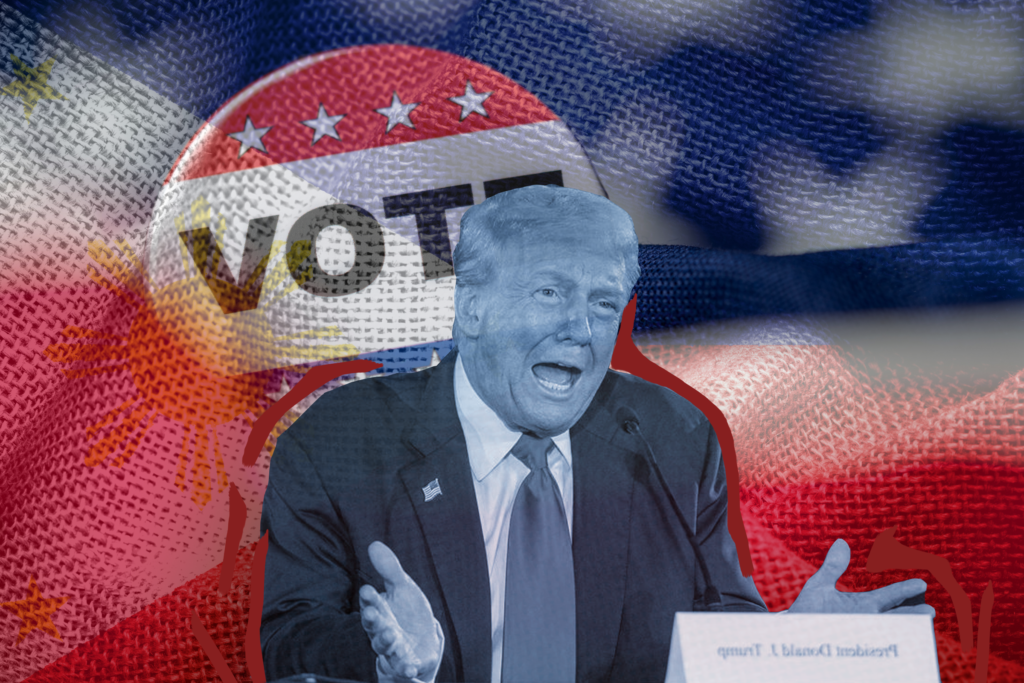PH Media’s lens on US Elections: Geopolitics, Populism, and Economic Impact

ALL EYES were on the United States (US) on November 4 to 8 as the Americans held what the US media had described as the most consequential election in history. On November 5, Republican candidate Donald Trump secured not just the 270 electoral college vote over Democratic candidate Kamala Harris but also the popular vote with 73 million votes over Harris’ 68 million votes.
Focusing on the implications for Philippine foreign policy, concerns for democracy around the world, and the economic consequences globally, including countless Filipinos abroad, the country’s news organizations closely followed the vote and the campaign leading to it, featuring it in its front pages or first half of primetime newscasts.
Philippine media’s coverage highlighted both the global stakes and its local impact. Reports highlighted the number of Filipinos-Americans participating in the 2024 elections, the US voting systems, as well as the long standing ties that hold the Philippines and the US.
Three main themes emerged in the Philippine coverage of the Trump victory.
West Philippine Sea
Philippine media discussed the fate of the West Philippine Sea (WPS) with Donald Trump as US president. Reports cited analysts who weighed the different stands taken by Harris and Trump on China.
Under the Biden administration, the US has been a consistent ally of the Philippines, upholding the 2016 Permanent Court of Arbitration ruling, which invalidated China’s expansive claims over the WPS.
In contrast, Trump’s foreign policy has been seen as more unpredictable. In ANC, political analyst Mike Chinoy highlighted Trump’s “America First” doctrine and its transactional approach to alliances. In his first presidency, the US maintained a strong military presence in the region and his combative rhetoric against China. But Trump has been notably more critical of multilateral agreements, such as the Philippines’ participation in the international rules-based order.
However, other views did not see that Trump would change the US stand on the WPS. In ABS-CBN News, Gregory Poling, director and senior fellow of the Southeast Asia Program and Asia Maritime Transparency Initiative at the Center for Strategic and International Studies, said that Washington will continue to help Manila deter Chinese hostility in Philippine waters.
Duterte and Trump alike
Media also projected the similarity between Donald Trump and former President Rodrigo Duterte, pointing to their rhetoric, authoritarian tendencies, and shared skepticism of institutions – characteristics which Fil-Americans favored. They saw Duterte’s leadership as strikingly similar to Trump’s “America First” platform. GMA Integrated News Online even noted that Trump first visited the Philippines during Duterte’s presidency.
Duterte’s pivot towards China and his attack on democratic norms were often compared to aspects of Trump’s populist appeal.
For some observers, the return of Trump to the White House raises concerns about the resurgence of authoritarian tendencies not only in the US but also around the world. “Globally, there is the rise of the strongman and of illiberal democracy. The Philippines was among the first who was afflicted with this “trend” — the effects of six years under Duterte is something we are still reeling from to this day,” a Rappler article pointed out, adding that Filipinos should “buckle up” next for the 2025 and 2028 elections.
Inquirer noted that Fil-Ams have been targets of an aggressive disinformation campaign. Krixia Subingsubing cited disinformation researcher Jonathan Ong who pointed out in his study how the campaign tactics tapped into migrant fears and sowed division across communities of color.
Philippine Immigration
The potential impact of the US election on the estimated 4 million Filipinos living and working in the United States was a major theme. Filipinos in the US send remittances to support families at home. US migration policy will have far-reaching consequences on their legal status, opportunities, and economic well-being.
Rappler and Inquirer.net pointed out the difference between Trump and Harris’ policies on immigration. Trump looks forward to mass deportation while Harris will continue Biden’s “friendlier” policies. Both reports said that a change in policies may indeed displace the millions of Filipinos in America.
Historical ties and PH-US alliance
Media’s long standing interest in US political affairs is rooted in the shared history of the two countries. Philippine media did well to highlight the issues in the US will shape not only the Philippines foreign affairs, but also the lives of millions of Filipinos who depend on remittances which may be affected by US immigration policies.
News coverage reflected the personal, political and international concerns of Filipinos who watched the changing of the guards in the US. The entire world watched this time as a controversial political figure took the helm of the largest democracy and the world superpower.
But in this country, the return of Donald Trump has stirred national anxieties about the future of Philippine democracy. Will the turn toward autocracy be a model for Philippine elections scheduled in 2025 and 2028?
Leave a Reply